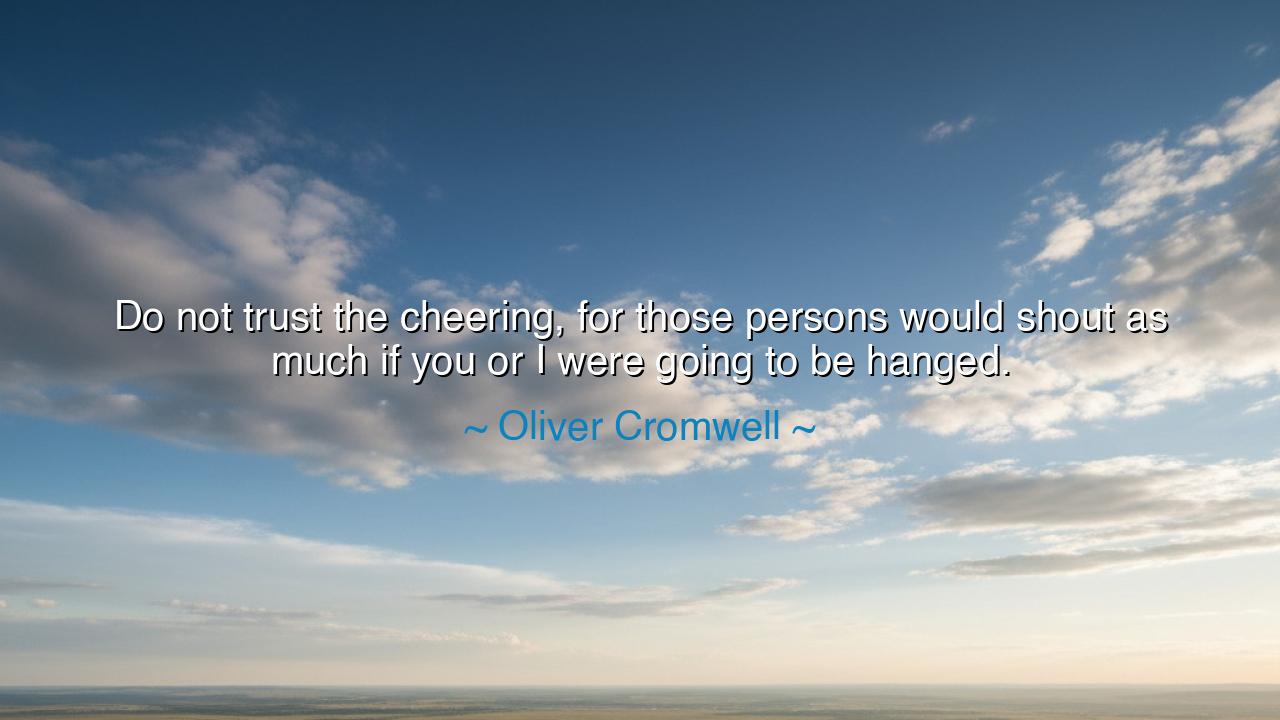
Do not trust the cheering, for those persons would shout as much
Do not trust the cheering, for those persons would shout as much if you or I were going to be hanged.






Hear the warning of Oliver Cromwell, the iron-willed leader of England’s great upheaval, who declared: “Do not trust the cheering, for those persons would shout as much if you or I were going to be hanged.” In these words lies the bitter wisdom of one who had seen the fickleness of crowds, who had stood both exalted and condemned in the court of public opinion. It is a reminder that the voice of the multitude is not constant, that the same lips which cry “Hosanna!” one day may cry “Crucify!” the next.
The meaning is sharp and unflinching. Cromwell warns that cheering, though it may fill the heart with pride, is not a true measure of loyalty or love. Crowds do not always cheer out of conviction, but often from the sheer force of spectacle, or the desire to be swept up in the emotion of the moment. Today they may raise their voices for your triumph, tomorrow they may do the same for your downfall. To place trust in such applause is to build one’s house upon sand, where the tide of opinion will wash it away without warning.
The origin of this wisdom lies in Cromwell’s own life as a revolutionary and ruler. He rose from obscurity to lead armies, to bring down a king, and to rule in his place. He was hailed as a savior by some, despised as a tyrant by others. He knew firsthand the volatility of public opinion, for the same people who cheered his victories cursed his memory after his death. Even his body, once honored, was exhumed and symbolically hanged, a grim testimony to the truth of his own words.
History has seen this pattern again and again. Consider the story of Julius Caesar, who was adored by the Roman people, yet struck down by senators who claimed to act in their name. The same citizens who once celebrated his conquests later welcomed his assassins as liberators—only to turn against them when the winds shifted once more. So too with Napoleon, who was exalted as a hero, then reviled as a scourge, then longed for again after his fall. The multitude is a fire that warms and destroys, never steady, always shifting.
O children of tomorrow, learn this truth: seek not your worth in the noise of the crowd. Their voices are loud but fleeting, their cheers sweet but shallow. If you anchor your heart to their applause, you will drift wherever their winds blow, rising and falling with every change of mood. Instead, anchor yourself to principles, to truth, to the quiet and steady voice of conscience that does not waver with fashion or frenzy.
Reflect upon your own life. Have you not felt the sting of praise that turned quickly into scorn? Have you not seen how some will flatter when it suits them, yet turn their backs when hardship comes? Cromwell’s words are not only for rulers and generals, but for every soul: do not measure your value by others’ acclaim, nor fear their mockery. For neither is eternal, and both are as unstable as the sea.
The lesson is clear: beware of the seduction of cheering. Welcome it if it comes, but never trust it. Trust instead in the steadfast love of a few, in the strength of your own convictions, in the righteousness of your actions. For the crowd may shout at your triumph, but they will shout just as loud at your fall. Live, then, not for their voices, but for the eternal voice of truth.
So let Cromwell’s words endure across generations: “Do not trust the cheering, for those persons would shout as much if you or I were going to be hanged.” May they remind us that applause fades, that honor is fleeting, but that integrity endures beyond the roar of the multitude. Better the quiet loyalty of a few than the thunderous praise of the many who do not understand.






BTdau ba thao
This quote feels like a cautionary tale about the dangers of seeking validation from external sources. Cromwell seems to imply that people’s opinions can be easily swayed by circumstances, and their enthusiasm may not hold much weight in the long run. Does this suggest that the only reliable source of validation is ourselves? How do we navigate public opinion when it can be so fickle and untrustworthy, especially in moments of personal crisis?
DCDo Cuong
Cromwell’s perspective on public admiration feels cynical but realistic. It makes me think of how we often look for validation from others, not realizing that this support can be incredibly transient. If people cheer regardless of the situation, does it mean that we can’t trust public approval at face value? How do we determine who is truly on our side if we can’t rely on the opinions of the crowd?
PHPhuong Ha
This quote by Cromwell gives me pause because it challenges the authenticity of public support. It’s almost as if he’s warning against the danger of trusting crowds and their temporary enthusiasm. How much of people’s support is real, and how much is just a reaction to the circumstances? Is it possible to distinguish between genuine loyalty and those who cheer just because it's easy or expected? I think this touches on a deeper issue of societal fickleness.
Nnbngo_c209
Oliver Cromwell’s quote seems to reflect the idea that people’s praise is often shallow and driven by the moment. It’s unsettling to think that cheering could be so detached from sincerity, especially when it’s given to someone just because it’s the popular thing to do. It makes me question how often we’re genuinely supported versus simply being a part of a crowd's fleeting excitement. How can we truly know when someone’s support is genuine?